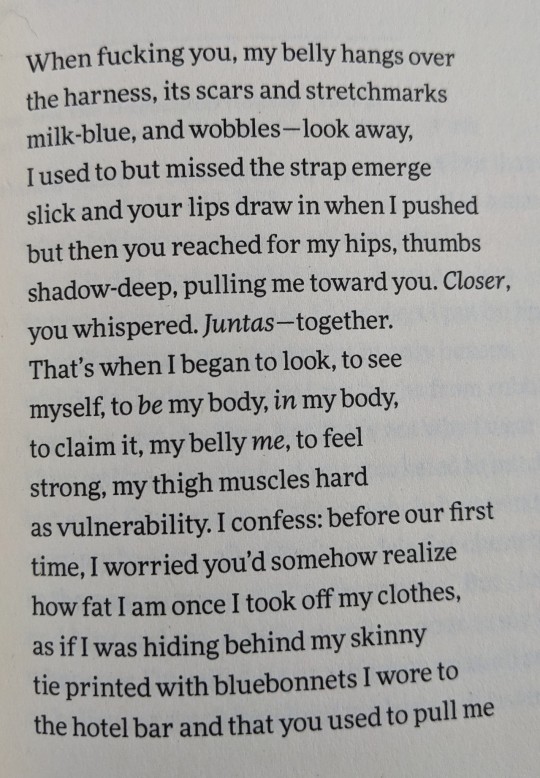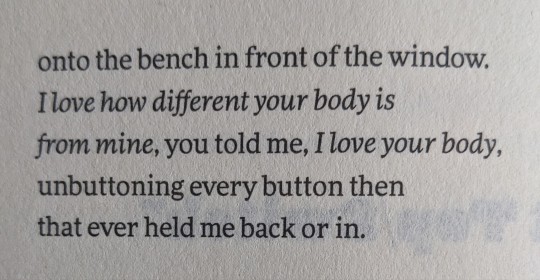butchinleather
807 posts
Teddy. 26. trans bisexual butch. Sideblog, if you see my main blog name no you didn't
Don't wanna be here? Send us removal request.
Text
The “Lesbian-Only Term” Myth: A Comprehensive Historical Essay on ‘Butch’ and ‘Femme’
CARRD VERS. (still with sources, updated more frequently)
INCLUDES (in this order):
Essay
Sources
FAQ
-
Before we begin, a key detail is that ‘lesbian’ originally was a synonym for ‘tribade’, meaning any woman who was intimate with another woman. Lesbianism was something someone did. You could have been ‘a lesbian’ and be romantically involved with a boy. Think of ‘lesbian’ and ‘lesbianism’ in these early times as being a synonym for ‘WLW’ (women loving women); a blanket term. It wasn’t until 1892 that neurologists used bisexual. And even then, it wasn’t until the 1960s (and no sooner) that the usage of ‘bi’ became common in a non-academic context. It wasn’t until 1988 that bisexual women and lesbians were more or less ‘officially’ separated (though the movement to separate them began beforehand), and it was also at this time that ‘lesbian’ began to mean ‘a woman exclusively attracted to women.’
There are multiple incidents and people credited with the coining of ‘butch’ and ‘femme’. I will go through all of the possible origins, before getting to what is, fairly obviously and easily, the actual origin of the terms.
The coining of the term ‘femme’ is often accredited to historical lesbian, Anne Lister. However, what is often left out of this statement is that the original use of ‘femme’ in the context of describing her partner, Marianna Lawton, who was also involved with a man. It wasn’t even Anne Lister saying it; rather, it was a woman friend who said to Anne about Marianna, ‘Plus femme que moi,’ which translates to, ‘She is more womanly than me.’ If one is saying that ‘femme’ was coined by Anne Lister, they are also saying that ‘femme’ was originally directed at and used to describe a woman who had some sort of romantic relationship with a man.
Butch is said to be a term coined by gay men to mean ‘masculine’ in a type of slang called Polari, otherwise known as Palare. Whilest the exact timeframe of this phrase becoming popularized is unclear, it was popular before the radical feminist movement had separated lesbians and bisexual women, meaning that, even if it did mean ‘masculine lesbian’, it would refer to all WLW, as that is what ‘lesbian’ meant at the time. Butch came into common use with lesbians in the 1940s; again, before the separationist movement came to split up the WLW community into ‘lesbians’ and ‘bisexuals’. There were plenty of butch non-monosexuals (which was the term back then for what we now know as bisexuality).
However, the first usage of ‘butch’ and ‘femme’ is actually ball culture. Ball culture was widely dominated by LGBT+ youth of color. The terms including ‘butch’ and ‘femme’ included:
Butch queen: cis MLM
Femme queen: trans and feminine woman
Butches: masculine-presenting women
Butch queen schoolboy realness: A cis MLM. The ‘realness’ refers to being able to ‘pass’ as a heterosexual male.
Femme queen realness: A trans woman. The ‘realness’ refers to being able to ‘pass’ as a cis woman.
Femme queen face: a category trans woman, highlighting their face.
Butch face: a category for masculine cis women, highlighting their face
Butch queen face: a category for cis men, highlighting their face
Vogue femme: a vogue category for cis MLM and trans men
Femme queen performance: a vogue category for trans women
As you can see, ‘butch’ and ‘femme’ applied to a wide variety of LGBT+ people! It’s easy to dismiss ball culture in the modern era, as it appears to have mostly been taken over by cishets at this point, but when it began, ball culture was for LGBT+ folks; a safe haven for trans, nonbinary and GNC people of color.
So, the terms ‘butch’ and ‘femme’ started off as slang and/or categories in a culture where the L, the G, the B, the T and the plus to all preform. Not even mildly close to lesbian-exclusive in that regard. But I’m sure, when you think about femme and butch history, you think of bar culture.
‘Butch’ and ‘femme’ labels closer to how we know them today started in lesbian-only gay bars, around the 1940s. However, ‘lesbian’, at this point in time, was still just a term meaning ‘WLW’, which means that lesbian bars were frequented by women exclusively attracted to women and women attracted to multiple genders. This means that not only were bi women there during yet another situation often accredited to coining these terms but, since these terms would have been born from bars where bi women would have been, that would have literally meant that bi women also helped to coin these terms, as well.
It wasn’t until the 1960s (and no sooner) that the word ‘lesbian’ began known as being exclusively attracted to women, and not to men whatsoever. The separationist movement between lesbians and bisexuals can be largely attributed to TERF Shelia Jeffery’s manifesto. It says, rather bluntly, ‘Our definition of a political lesbian is a woman-identified woman who does not (want to be intimate with) men,’ and describes bisexual women as ‘collaborating with the enemy’.
Women who took this stance on being attracted to only women as a political statement are often referred to as ‘political lesbians’. That is to say, of course, not all lesbians who defined lesbianism this way were radical feminists or political lesbians. However, for a, if not large, than extremely vocal, group, that is what lesbianism was to them; a political statement. By the 80’s, there was a firm split between bi women and lesbians, who proceeded to ignore the fact that the ‘traitorous’ bi women had ever been there at all. They successfully erased bi women’s history. After all, all of their history and culture had ‘LESBIAN’ written in big, bold, capital letters! This is why now, people can easily think that ‘femme’ and ‘butch’ are lesbian-exclusive; because radical feminists were purposefully trying to erase bisexual women’s part in their history.
This is, of course, not to say that bisexual people did not want their own community. Bisexuals had been fighting for their visibility for a long time before this! And, looking back, the separationist movement did end up giving us bisexuals our own community. However, that does not change the biphobic intentions of this movement, nor does it mean that bisexuals have to sacrifice years of shared history that they were purposefully erased from.
This is also not to say that there were not bisexual political lesbians, either. As many as one-fourth of bisexuals identified as a lesbian and as bisexual simultaneously, in the transitional period between lesbian being an umbrella term for all WLW, and lesbians and bisexuals being considered two separate things. These simultaneous identities were, of course, a product of their era, and were often bisexual radical feminist’s way of making their attraction to women a political statement. However, this information is even more proof of the era where those known as “lesbians” now and those known as “bisexuals” now lived comfortably under the then-umbrella term of “lesbian”.
In the words of Paula C. Rust’s 1995 book, 'Bisexuality and the Challenge to Lesbian Politics’: “Bisexuals were not outsiders… But insiders who were finally being honest about themselves.” Yes, indeed, we were insiders; we were always a part of the lesbian and gay communities.
With all of that historical context out of the way, it is time for the actual 'proof’, per say. LGBT+ newspapers and books are very important to LGBT+ history. They are snapshots of the culture at the time, and are crucial to preserving history; and this is true with butch and femme.
On usage of ‘femme’ outside of women exclusively being attracted to women; James McDoland’s Dictionary of Obscenity, Taboo and Euphemism, published in 1988, defines ‘fem’ like this:
“Fem (col.) A passive homosexual.
The term may be applied to both men and women, but more usually to men. It Australia it is generally applied only to men.
It is based upon the French word for women, femme, and indeed, in English, this spelling is sometimes used for passive lesbians, in preference to fem.”
Continuing with usage of fem(me) to describe men in books, is this quote from Leslie Feinberg’s ‘Stone Butch Blues’ (published in 1993):
“Jacqueline patted my thigh and flashed me a sweet smile. The other femmes - male and female - looked at me differently. As the world beat the stuffing out of us, they tried in every way to protect and nurture our tenderness.”
And, from the same book: “I ran my fingertips over the dark wood near my thigh. “I love them so much, too. But when gets it for me is high femme. It’s funny - it doesn’t matter whether it’s women or men - it’s always high femme that pulls me by the waist and makes me sweat.”
It is the obvious statement that men can use ‘femme’ that we are mainly interested in here. However, this means that the main character of ‘Stone Butch Blues’, who is, as the name implies, a butch, is attracted to both men and women, as stated in the second quote.
The writer of these books (Leslie Feinberg, in case you missed it; radical butch lesbian and trans activist) later had this to say in an interview: “And I would say that people who were referred to as drag queen, shemales, female impersonators, drag kings, diesel (d-slur)s, butches, et cetera, uh… Nowadays we think of them as being synonymous with a certain kind of sexuality, but in fact there’s a lot of butch women who sleep with other butches, or who are bisexual, and the same thing is true with feminine men.”
Again-again, with men using these terms, we have 'The Butch Manual’, published in 1982, which features men.

(ID: A picture of a butch woman in a newspaper, in black and white. The caption of the photo reads: Name that Butch. The first one to correctly identify this local Boston bi in her butch attire and email [email protected] will win a copy of ‘Hot & Bothered 4: Short Short Fiction on Lesbian Desire.’)
Now, going back to female bisexual butches, there is this newspaper from the 90s:

(ID: A picture of a butch woman. The caption of the photo reads: Name that Butch. The first one to correctly identify this local Boston bi in her butch attire and email [email protected] will win a copy of ‘Hot & Bothered 4: Short Short Fiction on Lesbian Desire.’)
Next, we have screenshots from the QZAP, which is an LGBT+ zine archive. The following are excerpts from 'Femmes Unite!’ and 'Mutate’. (Warning: These screenshots and transcripts hold reclaimed words that may be triggering. Each word in the transcript was written by someone who can reclaim it.)

(ID: A screenshot of an archived zine, in black and white. It reads: “F. A. G. PDX (Femme Affinity Group Portland) is a radical ACTIVIST AND SOCIAL group that seeks to create solidarity among femmes, promote femme visibility and combat femme phobia in the community at large. The group is open to self-identified femmes of all genders.”)
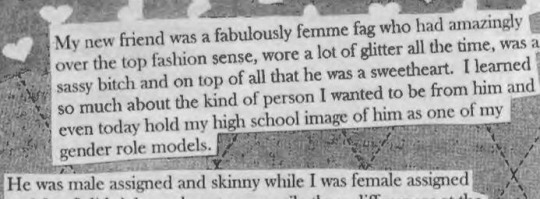
(ID: A screenshot of an archived zine, in black and white, with hearts above the text. It reads: “My new friend was a fabulously femme fag who had amazingly over the top fashion sense, wore a lot of glitter all the time, was a sassy bitch and on top of all that he was a sweetheart. I learned so much about the kind of person I wanted to be from him and even today hold my high school image of him as one of my gender role models. He was male assigned and skinny while I was female assigned”. At the end the text cuts off.)

(ID: A screenshot of an archived zine, in black and white. It reads: “femme this way, the persona appears to be unconvincing, unappealing to other female butches or femmes and gay men confirmed in those roles-I don’t come across as a "real” femme. Perhaps the". The text cuts off at the end.)
All of this is why the claim ‘butch and femme arose from the LESBIAN community for LESBIANS exclusively about the LESBIAN experience’ is misleading; lesbian communities were shared with bisexuals from the very beginning. ‘Lesbian’ meant all WLW. So, that means that butch and femme arose from the WLW community for WLW exclusively about the WLW experience. Bi women who are attracted to women and lesbians share the exact same history; the same history which created these terms. And it didn’t even just belong to WLW, historically! It was originally used in ball culture before anything else, which included the entire LGBT+ community.
Continuing on, in the 1985 documentary titled 'Gay Tape: Butch and Femme’, a femme asks another femme what her favorite part about being a femme is. She replied, “I love to flirt. I flirt with everyone… I flirt with anything that moves.” 'Anything that moves’ implies not only attraction to men, but is also a phrase generally associated with specifically bisexuality, thanks to the famous bisexual magazine titled that phrase.
Speaking of that very magazine, there is this letter to the editor in Anything That Moves, from issue 15, and published in 1997:
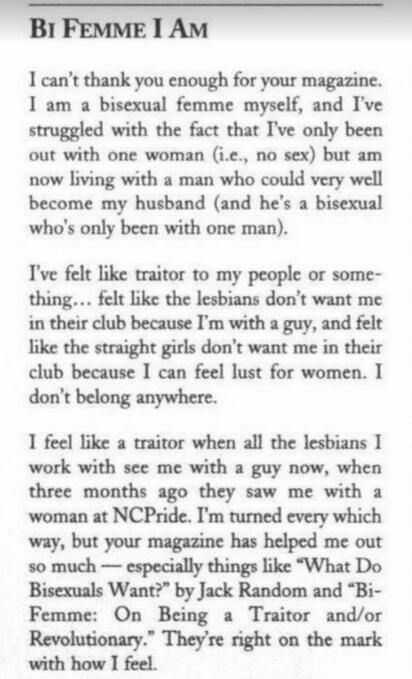
(ID: A screenshot of the letter in question, in black and white. The title reads: “Bi Femme I Am”. In smaller text below the title, it reads, “I can’t thank you enough for your magazine. I am a bisexual femme myself, and I’ve struggled with the fact that I’ve only been out with one woman (i.e., no sex) but am now living with a man who could very well become my husband (and he’s a bisexual who’s only been with one man).
I’ve felt like a traitor to my people or something… felt like the lesbians don’t want me in their club because I’m with a guy, and felt like the straight girls don’t want me in their club because I can feel like for women. I don’t belong anywhere.
I feel like a traitor when all the lesbians I work with see me with a guy now, when three months ago they saw me with a woman at NCPride. I’m turned every which way, but your magazine has helped me out so much - especially things like "What Do Bisexuals Want?” by Jack Random and “Bi-Femme: On Being a Traitor and/or Revolutionary.” They’re right on the mark with how I feel.“)
Now, what’s that on 'Bi-Femme: On Being a Traitor and/or Revolutionary’? Excellent question. There is a whole article on a bisexual using the femme identity in the 12th issue of 'Anything That Moves’! Here are a few select quotes from that article.
"My mama is a very smart woman. When I was 12 years old and I told her I was bisexual, all she said was, “Fine. As long as they don’t look like truck drivers.” I don’t mean that she was smart because she didn’t want me to date butch girls. She was smart because I think she knew that I was going to do it anyway. I was going to grow up to be a femme.”
“And as I got into my teens, I dated a lot of boys. All of them identified as bisexual or gay. Most of them were very, very femme.”
“Davis, Hollibaugh and Nestle include both male and female gender rebels within this definition. Femme, they say, seems perhaps to originate in a feminine love of queer sexual deviance, in general, of, as I’ve put it, “the boys inside my girls, and the girls inside my boys.””
“The argument goes on to say that my femininity allows me the privilege of passing as heterosexual in general, at all times in which I am not with butch women or in queer spaces defined by their presence. These people defined queer as butch women or femme men – people who they saw as gender rebels, whose gender choice was an inversion of hegemonic standards.”
“… Femme is an attraction to queerness in any form that satisfies hunger. I believe that understanding this is crucial to opening up femme identity to independence from butch identity – as standing separate from our more visible partners. Butch girls can fuck boys casually, without threatening their (d-slur) identities? Well, I want that right too, as well as the right to define what that sex means to me.”
That’s a whole lot of evidence, no? And we’re not even done with this particular source!
Once again from 'Anything That Moves’, we have an article on the second annual Femme Conference in San Francisco. Amongst other things, this article includes the following quotes,
“"Well,” I ventured, “to me, a femme is someone who takes the characteristics and stereotypes associated with being a woman and uses them as a source of personal power. Like, if someone is gonna stare at my body anyway, I’m damn well gonna make them look, and once I have their attention, I’m gonna tell them something. Get it?”“
"The conference organizers aimed to welcome every kind of person with more than a drop of femme in their souls, and to make plenty of space to talk about how we are, perform, or just love femme. Girls, boys, (d-slur)s, bi-femmes, (f-slur)-femmes, people from communities of color, young femmes, trans-femmes, lesbians, drag-femmes, working class and rich femmes, parents, fat femmes, and a few garden-variety freaks like me crowded the 33 workshops.”
“Femmes flocked to sessions like Femme As An Evolving Gender Identity; Bisexual Femmes and Femme Bisexuals; (f-slur) and Drag Femme…”
Again, in historical bisexual readings, we have a whole passage on the politics of being a bisexual butch… That even claims that most bisexual women were assumed be femme! It even suggests that femme women face some sort of version of biphobia; stating that there was a stereotype that they weren’t really interested in the same gender. The passage in question is titled “Too Butch to Be Bi (or You Can’t Judge a Boy by Her Lover)”, by Robin Sweeney, published in the book “Bisexual Politics” by Naomi Tucker, published in 1995. Here are a few choice quotes from this passage.
“I am a butch bisexual woman whose romantic and sexual partners are primarily other butch women, with some notable exceptions. Frequently, I like to appear as masculine as I can, often passing for male on the street. I like to keep my hair short. I’d rather wear jeans and boots than anything else.”
“But being a butch woman who is also bisexual can be difficult. It feels sometimes that the the idea is so challenging - since the assumptions in our communities are that all butch women are lesbian women and all femme women are bisexual women - that often a butch woman trying to come to terms with being bisexual is stuck.”
“The ideas about femmes (femme women aren’t really interested in other women, and femme men aren’t really interested in women at all) and butches (butches are always the aggressors in sex, whether they are men or women) permeate our queer culture. These ideas make it difficult for us to explore who we are and who we want to be.”
Going back to men in the butch / femme scene, we have these two quotes from a 2005 paper written about the rise of the macho biker image among gay men in the 60s:
“The homosexual ‘man in leather’ remains one of the more disproportionately visible and controversial members of the LGBT community. He is the antithesis of the feminized drag queen. He seeks to defy the stereotype of homosexual men as effeminate, limp-wristed, and ‘nelly.’ The leather-clad man presents himself as self-assured, assertive, dominant, or ‘butch.’”
“Homosexual men whose public identity more nearly conformed to mainstream constructions of masculinity referred to leather-men as ‘butch.’ The leather–man’s presentational strategies were and are regarded by some as deviant and unacceptable, especially to those homosexuals eager to ‘pass’ as ‘normal.’”
Again, in regards to bisexual history, we have the following quote from “Bi Any Other Name” (affectionately nicknamed 'the bisexual bible’, and originally published in 1991), from the point of view of a bisexual woman contemplating her identity:
“… I lay there on the mattress with Annah’s head upon my lap and my head drawing circles in her hair, imagining a world of only Annah and me. Nothing needed to matter, whether I was straight or lesbian, masculine or feminine, butch or femme…”
In the same book, we have a bisexual woman writing, “I began to reclaim what I had previously rejected as male identification, even renaming it 'butch identification’,” essentially stating that, in relation to her relationship with maleness and masculinity, she took on the label of 'butch’. She then proceeds to describe “fantasizing about getting a short haircut like my brother’s.”
In the same book again, we have a bisexual man describing his bisexual female partner as a butch, with the quote, “Her jeans and shirt complementing her blonde buzz-cut hair, she’s the only butch member of our household.”
We have definitions of these words from a text file from textfiles.com, an archive of textfiles originated from the 60s to the 80s. This textfile, titled “LesBiGay and Transgender Glossary” and originating from 1992, it defines the words as follows:
“Butch: 1. Masculine or macho dress and behavior, regardless of sexor gender identity. 2. A sub-identity of lesbian, gay male, or bisexual, based on masculine or macho dress and behavior. (See femme.) 3. (butch it up) To exaggerate masculine behaviors, usually for others’ entertainment. (See camp it up.)”
“Femme: 1. Feminine or effeminate dress and behavior, regardless of sex or gender identity. 2. A sub-identity of lesbian, gay, or bisexual, based on feminine or effeminate dress and behavior. (See butch.)”
These definitions, and this source in general, is of interest. Not only does it explicitly include bisexuals and make a point to say that these terms apply regardless of gender, but they also list 'butch’ and 'femme’ as examples of gender identities. It also uses 'butch’ in reference to drag in the reference for 'in drag’.
From the 1997 book Femme: Feminists, Lesbians and Bad Girls, we have this quote:
"Negative Message number three: “Don’t date a femme, because she’ll leave you for a man.’ […] I know tons of butches who have slept with guys, and for some reason there’s not some big stigma attached to that. That doesn’t threaten their membership in the lesbian community, but with us [femmes] it does.””
From a 2000s issue of 'Bi Women: The Newsletter of the Boston Bisexual Women’s Network’, we also have this quote: “But I also think bi women like to experiment with the wide range of possibilities along the butch/femme continuum without feeling confined by them. And that’s fun to watch! And I think many people assume that because bi women are also interested in men that they all would be femmes. Oh, how wrong they are—hallelujah for butch bi women!”
Hallelujah for butch bi women, indeed!
All of this is why the claim ‘butch and femme arose from the LESBIAN community for LESBIANS exclusively about the LESBIAN experience’ is misleading; lesbian communities were shared with bisexuals from the very beginning. ‘Lesbian’ meant all WLW. So, that means that butch and femme arose from the WLW community for WLW exclusively about the WLW experience. Bi women who are attracted to women and lesbians share the exact same history; the same history which created these terms. And it didn’t even just belong to WLW, historically! It was originally used in ball culture before anything else, which included the entire LGBT+ community, and you can see it being used to describe men outside of ball culture, too.
SOURCES:
(Source 1) (Source 2) (Source 3) (Source 4) (Source 5) (Source 6) (Source 7) (Source 8) (Source 9) (Source 10) (Source 11) (Source 12) (Source 13) (Source 14) (Source 15) (Source 16) (Source 17) (Source 18) (Source 19) (Source 20) (Source 21) (Source 22) (Source 23)
More Reading On This Subject:
The Evolution of Femme: As the user states, “In this project I hope to explore the evolution of femme identity and the changes it has gone through… I argue that femme is a term that has history in many parts of the LGBTQ community.“ A thoroughly interesting read, which dives into the different contexts of the femme identity.
A Brief His and Herstory of Butch And Femme: An article written by a nonbinary lesbian, talking about the ‘lesbian exclusive’ myth, calling out biphobia, and the irony of the “white butch and femme” ideal of terms that were originally made by QTPOC.
Why Butch/Femme Belong To Bisexuals As Well: An article written by a bisexual woman, which links to a multitude of sources, including books, essays and her other articles on bi matters.
And now, a FAQ, to debunk misinformation and common biphobic sentiments!
Q: I heard that bi women called themselves a part of the LGBT community when they were in a relationship with a woman, but called themselves straight when with a man.
A: This is misinformation. As I said before, ‘lesbian’ was not an identity; it was something you did. If you ever were in a relationship with or had attraction to a woman, you were a lesbian. They didn’t consider themselves a lesbian at some point, or straight at another; much more common was the phrase ‘non-monosexual lesbian’, if they even bothered to make a distinction at all. Again, I feel like I must compare how ‘lesbian’ was used to the term ‘WLW’ nowadays; even bi women nowadays who are in relationships with men are WLW. That’s how the term ‘lesbian’ worked.
Q: Uhhh, ‘doe’ and ‘stag’ were LITERALLY made for this reason. Use your OWN terms.
A: Yes, you’re right. ‘Doe’ and ‘stag’ WERE made out of pressure put on bi women to not ‘steal lesbian culture’. But do you realize how insanely dehumanizing it is to say, ‘You’re not allowed to identify as these terms with your history behind them, go identify as an animal instead’? Many WOC are uncomfortable with these terms, because they are animal terms. Plus, we never should have had to make those terms. ‘Femme’ and ‘butch’ belong to us, too. And we shouldn’t have to make up new terms with no history behind them just so people won’t bully us for using our terms. Bi women can identify as a stag or doe IF THEY WANT. It is not your place to tell them how to identify.
On this subject, the creators of the term ‘doe’ had this to say: “Why is there a perceived divide between ‘bi’ and ‘lesbian’ history? We share history. We run in the same circles. Usually kissing!… It (doe and tomcat discourse) exists within a framework that already posits bi women and lesbians as exclusive circles that sometimes overlapped, when really we have always been one circle, and radical feminism warped us… I created it (doe) as an alternative to femme because lesbians voiced discomfort with bi women using their self-identifiers. But what is yours and what is ours? Why are we inventing new language when we should be consolidating, reuniting, and celebrating one another?” (Source)
While I do not agree with everything that is said in that post, it is important to note that even one of the creators of these terms seems to be upset about having to create whole new terms for the bisexual community when bi women and lesbians share so much history.
Also, getting back to racism, ‘doe’ and ‘stag’ are very uncomfortably close to the term ‘buck’. ‘Black buck’ was a racist term used to describe black men who refused to follow the law of white people and is painted as rude and violent. This is yet another reason why bisexual people of color do not want to touch these terms with a 5-foot pole. (Source)
Q: Why can’t lesbians have something to themselves for once?!
A: Please, don’t pull the oppression competition card on me. All LGBT+ people are oppressed. It shouldn’t be a race of who is ‘the MOST oppressed’. Lesbians have a lot to themselves, and so do bi women. This not a matter of ‘letting a group have something for themselves’, or ‘we’re the most oppressed, you take everything from us’. This is a matter of taking back something that was purposefully and maliciously taken away from us by biphobic radical feminists.
Q: History doesn’t matter, it’s the NEW definition that matters, and the NEW definition means it’s a LESBIAN identity.
A: When bi women say that they want to identify as femme or butch, people pull out the ‘it’s always been a lesbian term, historically’ card. When we show said people the historical facts, people pull the, ‘it’s the NEW definition that matters’ card. Please choose one. Besides, if the definition changed one (from all WLW to lesbians), then it can change again, if you allow it. Plus, it’s really crappy to say, ‘I know you used to use these terms too, and they’re a part of your history, but, you can’t use them because we decided we don’t want you to. These are ours now.’
Q: But you are inherently available to men! You can’t be a butch or femme if you can be in a straight relationship!
A: Please, think about your wording. ‘Inherently available to men’ is a term many bi women detest. It makes us sound like an item for men to consume whenever they wish. Bi women cannot, by definition, be in a ‘straight relationship’, because, by her being in it, one of the parties is not cishet. Besides, some bi women aren’t even attracted to men (I’ve met women who are attracted to nonbinary people and women and call themselves bi). Even if a bi woman is currently in or looking for a relationship with a man, bi women (who didn’t have that term at the time) who were “available to men” identified as a femme or butch, when the terms were created and popularized.
Q: But if a man is with a woman who says she’s a butch or femme, that’ll perpetuate the stereotype that lesbians can be with men!
A: If a lesbian is telling a man they wouldn’t want to be with him, they wouldn’t just say, “I am a femme/butch.” They would say, “I am a femme/butch lesbian.” And if a man still tries to be with them after learning they are a lesbian, he is lesbophobic. That is not bi women’s faults. Besides, ‘femme’ and ‘butch’ are terms meant to define ourselves in our own community, not to straight men.
Q: You can’t understand what butch and femme REALLY mean unless you’re a lesbian.
A: So, we are ‘less WLW’ than you because we may or may not be attracted to men, so we cannot understand, is what you are saying? Or, more so that we aren’t able to understand it, but if we identified as lesbians, we would magically gain the ability to understand, because we’re lesbians? Definitions of words aren’t that hard to understand. We don’t use them because they’re ‘cool’. Bi women are not too stupid to understand, and it’s patronizing and INCREDIBLY rude to treat us like we’re too dumb to understand terms we helped to create.
Q: You kept talking about bi women in that essay. What about other LGBT+ people?
A: I talked specifically about bi women, because that is what I am and what this blog is about. However, I believe all LGBT+ people can use butch and femme. It was coined in ball culture, after all, which embraced all LGBT+ folks and their gender expression!
Q: Well, if it’s for all LGBT+ people and not just lesbians or WLW, what does it mean?
I believe that butch and femme are very contextual identities. There’s a lesbian context, a general WLW context, a trans context, a MLM context, and so on and so forth. However, generally speaking, I would say that a good definition for butch would be ‘a LGBT+ person whose masculinity is tied to them being LGBT+, and preforms masculinity for one’s self, and not because of societal pressure or the lackthereof.’ A good definition for femme would be similar, but replacing masculinity for femininity.
Q: This is implying that bisexuals aren’t different from lesbians and don’t deserve their own spaces.
Using terms that we were there for the coining of and the culture of is implying that how, exactly? By using ‘femme’ and ‘butch’, we aren’t saying we should all be one label again. We’re just saying, “This is our history, too, and although we are separate now, that doesn’t change that we were there for the coining of these terms and thus get to use them.” I’m not saying that we aren’t different. I’m saying that back then, there was no differentiation, and that it’s our history, too. Blocking bi women off from our history under the guise of “actually you’re being biphobic” (usually to somebody not bisexual to a bisexual) is just choosing to care about biphobia when it’s convenient to use against bisexuals who want access to our history, and is virtue-signaling at its finest.
Q: When the bisexual identity was created, 'butch’ and 'femme’ remained as lesbian terms. If bisexuals used them, why didn’t it change?
Because when the term 'bisexual’ was getting popular, the extremely popular radical feminist movement was trying to push them out of lesbian spaces purposefully, which previously belonged to them. It didn’t change because radical feminists (who held a LOT of power at that time) didn’t want it to, and because they were purposefully erasing bisexuals’ part in lesbian history, because we were 'traitors’. They hated us and wanted us out of their history. They made that painfully clear.
Q: I think that (x female historical figure or all female historical figures who was romantically with a man and used 'butch’ or 'femme’) was experiencing comphet or was forced to be with a man due to homophobia.
They might have been. But they might have also been bisexual. I don’t know for sure, and neither do you, and to be honest, I find debating dead peoples’ sexualities to be disrespectful (which is why I say 'was with a man’ rather than 'bisexual’ when talking about historical figures). Instead, I’ll just say: every single one? You really think that not a single one was bisexual? That’s… HIGHLY unlikely and bordering on implausible, which is not what you want a core part of your argument to be. (And I’m just going to mention real quick that ‘most/all people attracted to both men and women are with men due to comphet, they’re actually lesbians’ is a biphobic talking point, notably used by both the original radical feminist movement and the current one, and this argument is teetering DANGEROUSLY close to that.)
Q: If you’re bisexual, you have no room to discuss whether or not it’s lesbophobic for bisexuals to use these terms or not.
A: If you’re a lesbian, you have no room to discuss whether or not it’s biphobic for lesbians to erase and gatekeep our shared history or not.
Q: Just say you hate lesbians and go, lesbophobe!
A: Okay, so we’re going to try and claim that one is bigoted for literally just knowing their history now? Nowhere here did I say lesbians COULDN’T use these terms, either, which is, ironically, better than what femme/butch gatekeepers are trying to do. So, by this logic, maybe I should just reply to every femme/butch gatekeeper with ‘just say you hate bi women and go’!
Q: You’re not a femme or butch if you’re not a lesbian, no matter how much you say you are.
A: Ah, I see, we’re deciding other’s identities for them now? Alright. What if someone decided to say that all gay people are actually bi? By this logic, if someone decided to say, ‘Gay people are actually bi, no matter how much they say they are gay, so nobody can identify as gay or a lesbian anymore,’ that must make them correct!
No. It doesn’t make them correct. Just because you decide to say ‘you can’t be this thing no matter how much you say you are’ doesn’t mean that anybody has to listen to you, or change their label. And, before someone attempts to take this out of context; no, I don’t believe in my example statement. I was trying to make a comparison of a biphobic statement to what would be a lesbophobic/homophobic statement.
Q: I didn’t read this whole thing because it’s too long and because I think you’re wrong, and I’m not going to try and read obviously incorrect information.
A: I’ve gotten this response multiple times. I can’t force you to read this, but I must say that refusing to read historical facts because you can’t stand to be provided with evidence that you may be incorrect is extremely telling to your state of mind involving this topic. That’s basically just covering your ears, closing your eyes, and screaming, “LALALALA! I’M RIGHT! I CAN’T HEAR YOUUU, LALALA!”
Q: But I-
A: I’m sorry, but ‘but’ nothing. Even if I hadn’t supplied you with a humongous essay about the history of bisexual women and how they helped to create the culture around the words you’re trying to keep from us, you still wouldn’t try to control how bisexual women experience femininity or the lack thereof. Our history was purposefully erased by radical feminists who considered us traitors. We’re taking our history AND our terms back, and there is nothing that anyone can do to stop us.
6K notes
·
View notes
Text
Femme bi women married to men still have stories about queerness to tell that are worth hearing.
67K notes
·
View notes
Text
The way bisexual people of color and bisexual trans people have been excluded from discussions about their sexuality and community by people who aren’t even bisexual themselves because people are just that desperate to paint bisexual people as the white, cis individuals you see in media created by straight people to downplay the suffering we go through and prove that bisexual people live comfortable lives and only have to deal with minor inconveniences from society, at the most. It’s so tragic.
7K notes
·
View notes
Text
Reminder that femmes don't have to be skinny weak white women!! Femmes can be strong!! Femmes can be fat!!! Femmes can be any skin color!! Femmes can be gnc/genderqueer/nonbinary! Unlike terms like twink/hunk/bear, your body type doesn't determine whether you are butch or femme. Don't let anyone tell you you can't be a femme because of how you look! Love you all <3
4K notes
·
View notes
Text
So what I’ve learned from the past couple months of being really loud about being a bi woman on Tumblr is: A lot of young/new LGBT+ people on this site do not understand that some of the stuff they’re saying comes across to other LGBT+ people as offensive, aggressive, or threatening. And when they actually find out the history and context, a lot of them go, “Oh my god, I’m so sorry, I never meant to say that.”
Like, “queer is a slur”: I get the impression that people saying this are like… oh, how I might react if I heard someone refer to all gay men as “f*gs”. Like, “Oh wow, that’s a super loaded word with a bunch of negative freight behind it, are you really sure you want to put that word on people who are still very raw and would be alarmed, upset, or offended if they heard you call them it, no matter what you intended?”
So they’re really surprised when self-described queers respond with a LOT of hostility to what feels like a well-intentioned reminder that some people might not like it.
That’s because there’s a history of “political lesbians”, like Sheila Jeffreys, who believe that no matter their sexual orientation, women should cut off all social contact with men, who are fundamentally evil, and only date the “correct” sex, which is other women. Political lesbians claim that relationships between women, especially ones that don’t contain lust, are fundamentally pure, good, and unproblematic. They therefore regard most of the LGBT community with deep suspicion, because its members are either way too into sex, into the wrong kind of sex, into sex with men, are men themselves, or somehow challenge the very definitions of sex and gender.
When “queer theory” arrived in the 1980s and 1990s as an organized attempt by many diverse LGBT+ people in academia to sit down and talk about the social oppressions they face, political lesbians like Jeffreys attacked it harshly, publishing articles like “The Queer Disappearance of Lesbians”, arguing that because queer theory said it was okay to be a man or stop being a man or want to have sex with a man, it was fundamentally evil and destructive. And this attitude has echoed through the years; many LGBT+ people have experience being harshly criticized by radical feminists because being anything but a cis “gold star lesbian” (another phrase that gives me war flashbacks) was considered patriarchal, oppressive, and basically evil.
And when those arguments happened, “queer” was a good umbrella to shelter under, even when people didn’t know the intricacies of academic queer theory; people who identified as “queer” were more likely to be accepting and understanding, and “queer” was often the only label or community bisexual and nonbinary people didn’t get chased out of. If someone didn’t disagree that people got to call themselves queer, but didn’t want to be called queer themselves, they could just say “I don’t like being called queer” and that was that. Being “queer” was to being LGBT as being a “feminist” was to being a woman; it was opt-in.
But this history isn’t evident when these interactions happen. We don’t sit down and say, “Okay, so forty years ago there was this woman named Sheila, and…” Instead we queers go POP! like pufferfish, instantly on the defensive, a red haze descending over our vision, and bellow, “DO NOT TELL ME WHAT WORDS I CANNOT USE,” because we cannot find a way to say, “This word is so vital and precious to me, I wouldn’t be alive in the same way if I lost it.” And then the people who just pointed out that this word has a history, JEEZ, way to overreact, go away very confused and off-put, because they were just trying to say.
But I’ve found that once this is explained, a lot of people go, “Oh wow, okay, I did NOT mean to insinuate that, I didn’t realize that I was also saying something with a lot of painful freight to it.”
And that? That gives me hope for the future.
149K notes
·
View notes
Note
do you have any sources on the claims you made? im always willing to change my stance if you have legitimate backing for it haha
So first, I’m sorry for blowing up at you the way that I did. I’m not proud that I reacted in such a kneejerk, aggressive fashion. Thank you for being open to hearing what I have to say. I’m sorry for mistaking you for a TERF, and I’m sorry my response has caused other people to direct their own hostility towards you.
So, here’s the thing. “You can’t call bi women femmes” is pretty intrinsically a radfem thing to say, and I am deeply opposed to letting radfems tell me what to do. I’m trying to write this during a weekend packed with childcare and work. I’ll try to hit all the high notes.
The one thing I am having trouble finding is the longass post I talked about in my reply, that was a history of butch/femme relationships in lesbian bars, which had frequent biphobic asides and talked about “the lesbophobic myth of the bi-rejecting lesbian”; the friend who reblogged it without reading it thoroughly has deleted it, and I can’t find it on any of the tags she remembers looking at around that time. If anyone can find it, I’ll put up a link.
As far as possible, I’m linking to really widely accessible sources, because you shouldn’t intrinsically trust a random post on Tumblr as secret privileged knowledge. People have talked about this at length in reputable publications that your local library either has, or can get through interlibrary loan; you can look up any of the people here, read their work, and decide for yourself. This is a narrative of perspectives, and while I obviously have a perspective, many people disagree with me. At the end of the day, the only reason I need for calling bi women femmes is that You Are Not The Boss Of Me. There is no centralized authority on LGBT+ word usage, nor do I think there should be. Hopefully this post will give you a better sense of what the arguments are, and how to evaluate peoples’ claims in the future.
Keep reading
1K notes
·
View notes
Text

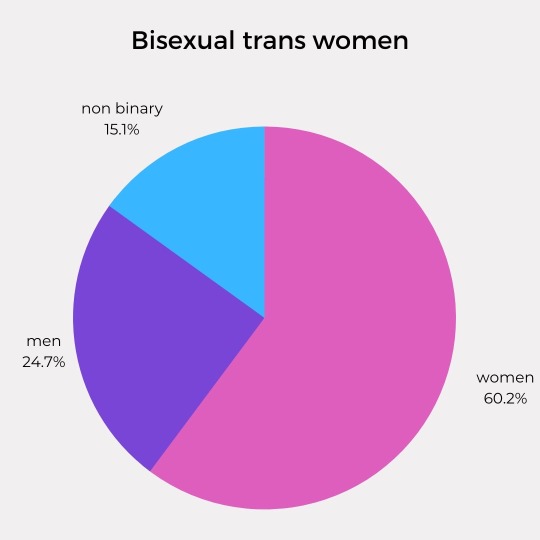
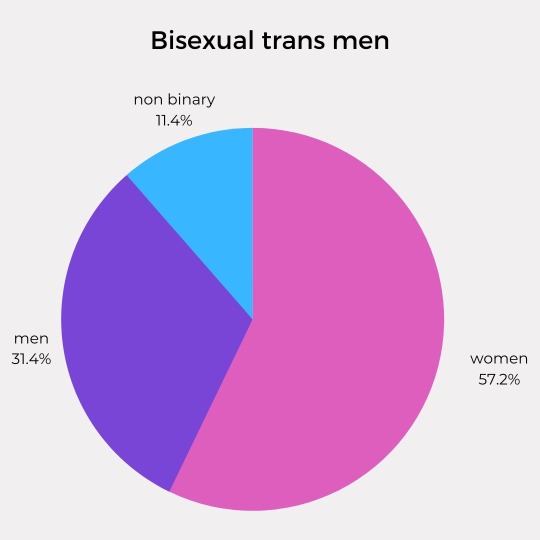
Data from a recent report, which shows which types of relationships bisexual people are in. So you all can stop with your biphobic ‘bisexuals are always in M/F relationships’ nonsense.
(Note: binary trans people are included in the first graphic. The last two graphics are just created to be exclusively about them.)
Graphics by @isthisbicuIture on Twitter
Study: https://www.ilga-europe.org/report/intersections-the-lgbti-ii-survey-bisexuals-analysis/
417 notes
·
View notes
Text
Too Butch to Be Bi (or You Can't Judge a Boy by Her Lover)
by Robin Sweeney
"It wasn't difficult for me to come out as a lesbian. In fact, most people I knew in high school assumed I was gay long before I started grappling with my own identity. I have, as one lover told me, “the face.” When I asked her what she meant, she said that I just looked like a dyke. And it's true. Even in pictures of me at four or five, I look like a little dyke. No one has ever been surprised to find out I was queer.
I ran into pretty standard teenage homophobia - my own internalized version and from others - but I was fortunate to grow up in a Southern California town with a surprising number of openly gay and bisexual adults and teenagers. While Aaron Fricke was making headlines taking another boy to his prom, the administrator in charge of student social events at my high school made it quietly known that same-sex couples were allowed to attend the prom together.
Even though I fit the stereotypes and images of what a lesbian was supposed to be, it wasn't always a comfortable identity for me. I was sexual with men - and liked it - and that fact was a problem for a lot of women and men I met in the lesbian and gay community. It was a problem for me, too. I didn't know how to come to terms with being bisexual and still maintain my butch identity and connection to the gay community.
------
Sexual minority communities do a lousy job of confronting our assumptions about ourselves and each other. We hold onto the same notions about difference that the dominant, heterosexist culture teaches us and apply these to our own queer communities. Most of the time this doesn't work, and nowhere is this more true than in our assumptions about appearance, gender, and sexual identity.
I am a butch bisexual woman whose romantic and sexual partners are primarily other butch women, with some notable exceptions. Frequently, I like to appear as masculine as I can, often passing for male on the street. I like to keep my hair short. I'd rather wear jeans and boots than anything else. Sometimes I pack when I go out, putting my dildo in my pants and wearing my dick out of the house. (No, people don't really notice that often. And the ones who do notice are the ones I'm probably trying to attract.)
------
But being a butch woman who is also bisexual can be difficult. It feels sometimes that the the idea is so challenging - since the assumptions in our communities are that all butch women are lesbian women and all femme women are bisexual women - that often a butch woman trying to come to terms with being bisexual is stuck.
------
But once we find a community that is accepting of our same-sex interests, we run into an entirely different series of messages. A number of these are about appearances and what they are supposed to say about who we are. The ideas about femmes (femme women aren't really interested in other women, and femme men aren't really interested in women at all) and butches (butches are always the aggressors in sex, whether they are men or women) permeate our queer culture. These ideas make it difficult for us to explore who we are and who we want to be. Many people feel too threatened to challenge the status quo of an already fringe community, for fear of being outcast from the one place where they have struggled to belong."
------
Bisexual Politics edited by Naomi Tucker, 1995.
6K notes
·
View notes
Text







the butch/femme scene of 1990s san francisco by chloe sherman
44K notes
·
View notes
Text
A lot of people are severely dysphoric but also like the physical sensation of oral. Being able to hide but feel helps people who experience this. 👍.
Do the dykes et al. of Tumblr know about lorals and if yes why didn't they tell me about them? A dental dam you can just slip on like underwear are you serious? You don't have to mess around snipping up condoms or holding it carefully in place (good luck scissoring without direct contact)? Butches with bottom dysphoria do you see how good this could be for us?
The amount of cool fun safe trans sex that can be had alone is amazing
6K notes
·
View notes
Text
You are not the only person in the world and your experiences are not universal, happy to help.
Do the dykes et al. of Tumblr know about lorals and if yes why didn't they tell me about them? A dental dam you can just slip on like underwear are you serious? You don't have to mess around snipping up condoms or holding it carefully in place (good luck scissoring without direct contact)? Butches with bottom dysphoria do you see how good this could be for us?
The amount of cool fun safe trans sex that can be had alone is amazing
6K notes
·
View notes
Text
Fat butches are responsible for peace and love on earth
4K notes
·
View notes
Text

Leslie Feinberg + Minnie Bruce Pratt dancing | NYC | 2000
2K notes
·
View notes
Text
Being non-binary is like instead of having an angel and a demon on ur shoulder u have a faggot and a dyke
71K notes
·
View notes
Text

WHAT IS SAID AT THE MICHIGAN WOMEN’S MUSIC FESTIVAL DOES NOT STAY IN RURAL MICHIGAN by Kay Lamothe
450 notes
·
View notes
Text

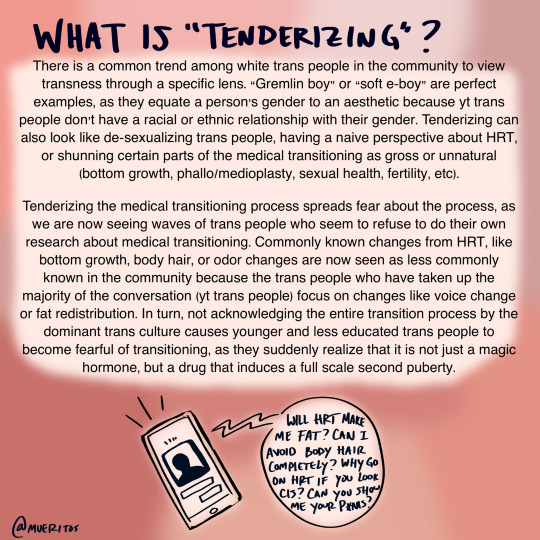




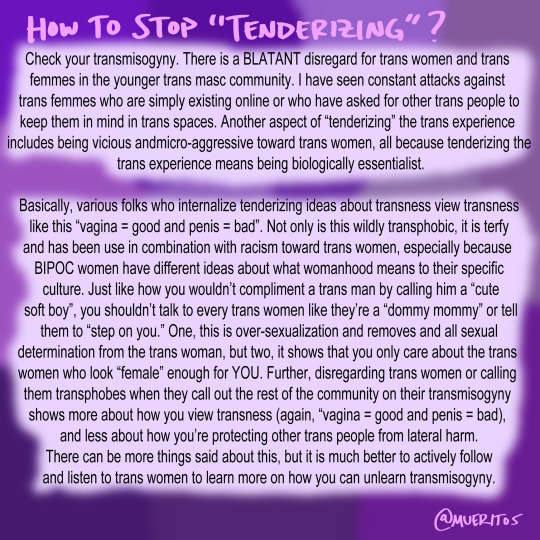
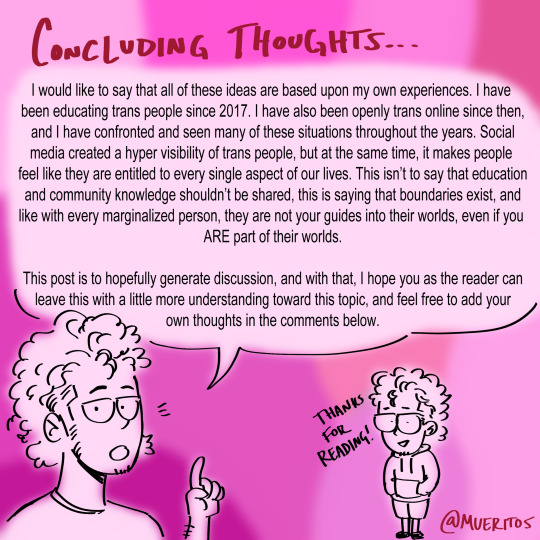
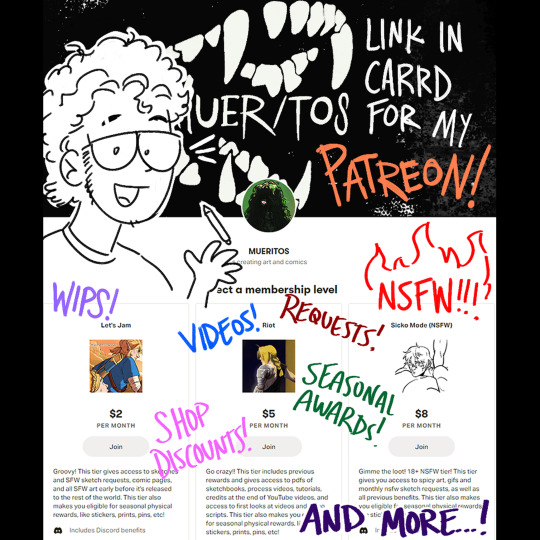
Some thoughts about online trends, hyper visibility of trans people, and more…
patreon
6K notes
·
View notes
